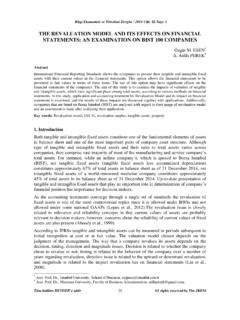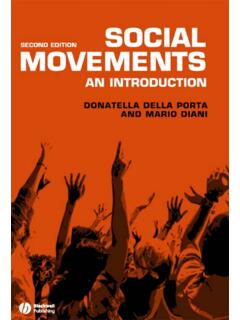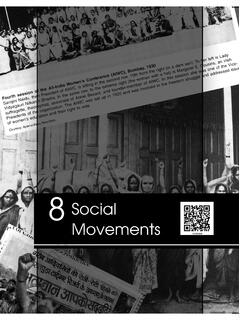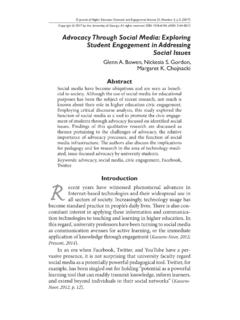Transcription of WHY SOCIAL MOVEMENTS OCCUR: THEORIES OF SOCIAL …
1 Bilgi Ekonomisi ve Y netimi Dergisi / 2016 Cilt: XI Say : I T m haklar BEYDER e aittir 125 All rights reserved by The JKEM WHY SOCIAL MOVEMENTS OCCUR: THEORIES OF SOCIAL MOVEMENTS Anindya SEN* mer AVCI Abstract In this study, the emergence of SOCIAL MOVEMENTS is examined. To understand why SOCIAL MOVEMENTS are born (and grow), we looked at the following THEORIES that try to understand the origins of SOCIAL MOVEMENTS : deprivation theory; resource mobilization theory; political process theory; structural strain theory; and new SOCIAL movement THEORIES . The paper also demonstrated how some of these THEORIES can be used to explain some prominent SOCIAL MOVEMENTS .
2 Finally, the paper also discussed how SOCIAL MOVEMENTS are intimately tied up with various forms of adult learning. Key words: SOCIAL MOVEMENTS , deprivation theory, resource mobilization theory, political process theory, structural strain theory, new SOCIAL movement THEORIES Introduction What causes SOCIAL MOVEMENTS to be born? Are the causes political or economic or cultural in nature? Over the last few decades academic researchers have pondered the reasons why various types of SOCIAL MOVEMENTS are born and subsequently grow. They have come up with various THEORIES to explain the birth, growth, and maturation of SOCIAL MOVEMENTS in diverse parts of the planet. This paper takes a look at some of the major THEORIES of SOCIAL MOVEMENTS that have been proposed over the years and how these THEORIES can explain the birth and growth (or lack thereof) of specific SOCIAL MOVEMENTS .
3 The paper also looks at how some of these THEORIES fare in dealing with the Internet-era SOCIAL MOVEMENTS , like the controversial anti-globalization movement . Finally, the paper also takes a look at how these THEORIES bridge the gap between SOCIAL MOVEMENTS and any form of adult learning that might occur as a result of participation in these MOVEMENTS . 1. Prominent THEORIES of SOCIAL MOVEMENTS Starting in the 1950s the US and Europe saw an explosion of protests and demonstrations against governments, government policies, and existing SOCIAL practices (Phongpaichit, 1999). In the US alone, there were the Civil Rights movement , the anti-Vietnam War movement , the feminist (and gender equality) movement , the green or environmental movement , etc.
4 Europe also saw its versions of the feminist and environmental MOVEMENTS as well as the anti-colonial movement (as for example, the pro-Algerian Independence movement in France). With the occurrence of these SOCIAL MOVEMENTS arose the question as to why SOCIAL MOVEMENTS are born and grow. SOCIAL scientists, especially American and West European academic scholars, tried to develop THEORIES to understand the origins of these MOVEMENTS and to predict the future course of these MOVEMENTS (Phongpaichit, 1999). Some of these THEORIES are as follows: deprivation (or relative deprivation) theory; resource mobilization theory; political process theory; structural strain theory; and new SOCIAL movement THEORIES .
5 There have been actually many other THEORIES that have been proposed to explain the birth and growth of SOCIAL MOVEMENTS , but the above are usually regarded as * Dr., Northern Illinois University, Assist. Prof. Dr. stanbul Medeniyet University, The Journal of Knowledge Economy & Knowledge Management / Volume: XI SPRING 126 T m haklar BEYDER e aittir 126 All rights reserved by The JKEM among the more prominent amongst them. In the following section, I will take a more detailed look at each one of the above THEORIES and how each one can be applied to understanding one particular SOCIAL movement . The THEORIES : A Detailed Look What follows is a description of the main tenets of each one of the above-listed THEORIES , their strengths and weaknesses, and how each theory can be applied to explain the birth and growth of a specific SOCIAL movement .
6 Deprivation Theory According to proponents of the deprivation theory, some SOCIAL MOVEMENTS are born when certain people or certain groups of people in a society feel that they are deprived of a specific good, service, or resource (McAdam, McCarthy, & Zald, 1988; Opp, 1988). Within the deprivation theory camp, there were two branches: absolute deprivation and relative deprivation. The proponents of absolute deprivation treated these grievances of the affected group in isolation from that group's position in society. Proponents of relative deprivation, on the other hand, regarded a group to be in a disadvantageous position vis- -vis some other group in that society (McAdam, McCarthy, & Zald, 1988).
7 The deprivation theory, seemingly, provides a powerful reason as to why some SOCIAL MOVEMENTS may be born. However, it does have one major disadvantage that is difficult to explain away. It fails to explain why in some cases deprivation fails to ignite the birth of a SOCIAL movement . This gives rise to the suspicion that while the existence of a deprivation may be a necessary condition for the birth of a SOCIAL movement , it may not be a sufficient condition for the SOCIAL movement to be born. In other words, for a SOCIAL movement to be born, deprivation needs to be present along with other factors (that the deprivation theory overlooks) in order for a SOCIAL movement to be born.
8 In spite of the above difficulty, it seems that the deprivation theory may provide a partial explanation as to why a SOCIAL movement is born. For instance, one can argue that the feminist movement was born in the 1960s because prior to that time women were "deprived" by society of rights and opportunities (especially in terms of a career) that were only accorded to men. In a similar manner, one can argue that the civil rights movement in the was born because before that movement non-white people were "deprived" of basic rights and privileges that their white counterparts enjoyed. Again, we must keep in mind that in the two above-mentioned situations, deprivation of basic rights and opportunities was one of the causes as to why those two MOVEMENTS were born -- we have to also look for other factors that acted in conjunction with deprivation to give birth to those two MOVEMENTS .
9 Resource Mobilization Theory The resource mobilization theory invokes the importance of the availability of suitable resources in the birth of a SOCIAL movement . This theory thus says that when some individuals in a society have certain grievances, they may be able to mobilize necessary resources to do something to alleviate those grievances. The term "resources" in this context refer to things like money, labor, SOCIAL status, knowledge, support of the media and political elites, etc (Dobson, 2001; Foweraker, 1995; McAdam, McCarthy, & Zald, 1988; Phongpaichit, 1999) . One of the great advantages of this theory is that it offers a convincing explanation as to why in some situations some grievances may give birth to a successful SOCIAL movement , whereas in other situations the same types of grievances may not give birth to anything similar.
10 Bilgi Ekonomisi ve Y netimi Dergisi / 2016 Cilt: XI Say : I T m haklar BEYDER e aittir 127 All rights reserved by The JKEM One of the major criticisms of this theory is that it has an extremely strong "materialist" orientation in that it gives primacy to the presence of appropriate resources (especially money) in explaining the birth of SOCIAL MOVEMENTS . There are SOCIAL MOVEMENTS that have been born even when resources (especially financial ones) were scarce. This theory does provide a good explanation of why some SOCIAL MOVEMENTS have been able to grow at an exponential rate, even in the presence of seemingly insurmountable obstacles. The civil rights movement in the is a classic example of this type.






